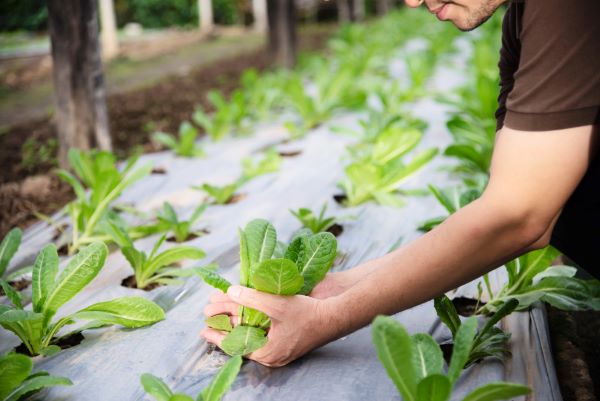
Unlocking Secrets: Why Mulching Films Are Good For Farming
Agriculture is one of the strongest nurturing forces upon which humanity exists. Agriculture involves not only producing food but also raising livestock, providing clothing materials, and fuels for energy. Farming is an integral part of agriculture without which we would not be able to thrive. Agriculture has evolved by integrating modern techniques, science and sustainable practices to meet the global demand. One of these sustainable practices includes mulching films.
What Are Mulching Films?
Mulching is a technique to cover the topsoil with a layer of material to conserve soil moisture and curb weed growth by regulating soil temperature while preventing water loss. Films that are used for mulching are known as mulching films. These films are made of strong LLDPE and LDPE material to resist any weather conditions.
What Are The Benefits Of Mulching Films In Farming?
These films are being used by farmers extensively. Considering the benefits of these films, their popularity has increased over the years. Mulching give multiple benefits to the plants.
Below are some of the benefits of using mulching in farming:
1. Regulate Soil Temperature
During high temperatures and hot weather, mulching help to regulate soil temperature. It creates a protective barrier between the soil and the outer weather conditions keeping the soil cooler.
2. Maintain Soil Moisture
One of the harmful aspects of the inappropriate growth of the crops is loss of soil moisture. Losing moisture from the soil can eventually lead to dry soil which is not good for plants. The use of these films plays a crucial role in retaining the level of humidity in the soil making it beneficial for plant growth.
3. Suppress Weed Growth
These films are good for suppressing the growth of weeds in the soil. Weeds take up all the essential nutrients from the soil. This hinders the growth of the crops. However, the application of mulching prevents the weeds from germinating and taking up the space, water and nutrients from the soil. This helps the farmers by reducing the manual work of weeding and the use of herbicides.
4. Improve Soil Health
Over time, these films can be used for the betterment of soil structure and fertility. Mulching encourages microbial activity in the soil by retaining moisture and controlling temperature. Biodegradable films can decompose into organic matter while enriching the soil.
5. Reduce Soil Erosion
Rain and soil are the main factors for soil erosion. Mulching films are good for reducing soil erosion. The layer of mulching films on the topsoil prevents wind and rain from coming into contact with the soil. This is especially beneficial on sloppy terrain or areas that are prone to erosion. Using these films helps in retaining the soil structure and nutrients.
6. Water Retention
These are very useful for bringing down the rate of water fluctuation in the soil while conserving water. These films are great for maintaining a consistent level of humidity in the soil making it beneficial for plant growth.
7. Enhance Crop Quality
The application of these helps retain moisture in the soil, determine soil balance, regulate temperature, and suppress weeds. All these together contribute to higher yields and better-quality crops. Farmers can have more predictable and consistent harvests by incorporating mulching films in farming.
8. Protects From Crop Diseases
Providing a barrier between plants and soil-borne pathogens, mulching films reduce the risk of diseases that affect crop health in some cases. In an intensive cropping system, this is very beneficial as disease management is important for productivity.
9. Extend Growing Season
In areas where the growing season is shorter and the climate is cooler, mulching films can create a microclimate around the plants to extend the growing seasons. This allows farmers to plant earlier and harvest later.
10. Labor Savings
The usage of mulching films can reduce the manual labour of weeding and watering. This allows the farmers to use the resources more efficiently by focusing on the phases of farm management.
11. Environmental Benefits
Using biodegradable mulching films or those made from recycled materials, can be beneficial for the environment. Biodegradable films break down over time and mix with the soil adding nutrients to it. With the use of these mulching films, we can reduce plastic waste, lower our carbon footprint and improve the sustainability of farming practices.
Altogether, by improving soil health, increasing productivity, and reducing environmental hazards, mulching films help farmers take a step toward sustainable farming practices. The versatility and effectiveness of mulching films make them an integral part of modern agricultural practices.
Why Choose Neha Mulch Film?
We curate high-quality mulching films to meet the diverse demands of the farmers. Neha Mulch Film’s mulching films are highly durable and ready to withstand any weather conditions. We promote sustainable farming practices and offer farmers to choose from our premium range of mulch films to fit their requirements.
Incorporating these sustainable films into your farming practices higher yields with a better future. Embrace Neha Mulch Film’s mulching films to experience a transformative change in your fields.
Also, read our other blog: Farming Like Never Before? Agricultural Mulch Films By Your Side!

